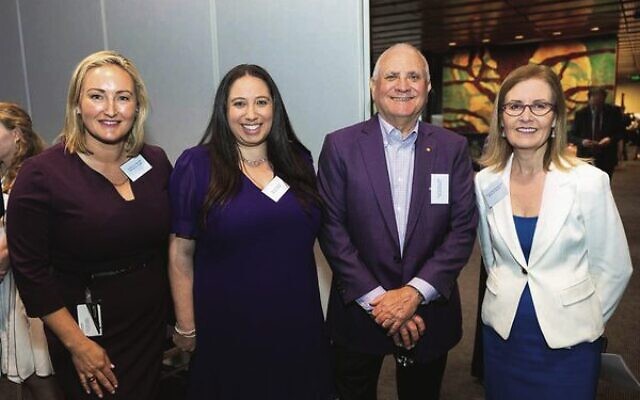We all have something we can contribute
How do we give money to those who desperately need it, when currently, so many of us are floundering ourselves? There are so many other ways we can help.

I was brought up to appreciate that community is the backbone of our society. I was also brought up to understand that there are many ways to give back to community.
I have witnessed how the Jewish community bands together in times of crisis and in times of joy. When terror attacks happen in Israel, we mourn together. During COVID there were countless examples of the community coming out in droves to support businesses and individuals. When someone is sick, or rejoicing in a birth, we plan meal trains. For Yom Ha’atzmaut, we come together to celebrate.
I have also witnessed firsthand how my own Sydney community wrapped their arms around my family when my mother, Rochelle Goulburn, passed away, as people poured into our home during the shiva period and delivered countless food options. And it wasn’t just our friends and family. It truly was the community. Which is why I so strongly believe in giving back.
My sister and I joke that we share my dad, Daniel Goulburn, with our community. He has always been a strong advocate for helping the community in whatever way we can, whether that’s sitting on boards, volunteering with schools, attending community events or giving financially.
But that final one seems to have stumped us all recently. At the moment, can my generation help in the same way that previous generations have?
There’s no denying that a cost-of-living crisis has hit Australia, and as CEO of the Melbourne Jewish Charity Fund, Yoni Paluch wrote in The AJN June 30 edition: “Our community is not immune.” Paluch shared that many families in the Australian Jewish community are struggling to put food on their tables. They may not be able to afford the medicine they need. He noted that 64 per cent of Australians experiencing food insecurity actually have a job, with 37 per cent in full-time employment.
Right now, it takes more than a decade to save a deposit for a home. According to finder.com, in 1984, the average Australian could buy a home that cost 3.3 times their annual income. Now, it’s 10 times what the average person earns in a year. The national mortgage repayments ratio is above 40 per cent of incomes, overtaking the GFC peak of 42.1 per cent in March 2008. Mortgage affordability is at its worst since 1990.
Then for young parents, there’s schooling. According to conversations I’ve had, to consider Jewish education, many parents rely on help from grandparents or bursaries.
Everyday expenses have gone up too. Electricity is soaring. A bag of groceries that would previously have cost $50 is now in the hundreds. I’ve spoken to many friends who have cut down dramatically on eating out, have stopped buying red meat and turned to frozen fruit and vegetables, have sold their car or cancelled holidays.
So, how do we give money to those who desperately need it, when currently, so many of us are floundering ourselves?
I’d argue that we don’t necessarily need to. There are people in every generation who can afford to financially support those in need. And the community will be forever grateful for that. It has also been noted that this generation will out-give the previous one, we just need to get through the next few years.
But, if you can’t give financially at the moment, there are many other ways to give back. You can volunteer your time, knowledge and expertise. You can share your networks.
Are you a whiz at marketing? Do you understand numbers like the back of your hand? Join a committee or board and lend your expert knowledge. Love being around people or kids? Volunteer your time at your school’s canteen or join the P&F. Become a mentor for another person.
I know a thing or two about this. When my mum died from pancreatic cancer, my family and I set up #PurpleOurWorld – a social media movement to raise awareness for the disease. While we originally considered setting #PurpleOurWorld up as a charity, it was my dad who convinced us that there was another way.
So, we work with the existing charities in Australia and around the world to raise money and awareness. We speak to government bodies and parliamentarians, experts and the general community.
We knew that not everyone can give money. But anyone with a social media handle can share our posts. Anyone can attend our functions or webinars, and wear purple on World Pancreatic Cancer Day. Everyone can amplify our message.
And this is what I’m keeping in mind as I take part the JCA and UIA Philanthropy Fellowship in Sydney, facilitated by Australian Jewish Funders.
Because we all need to understand that it’s great to give money – even $50 can make a big difference – but it’s just as important to give of our time, our expertise and our care. Because we all have something we can contribute.
Jessica Abelsohn is the digital content manager and arts editor of The AJN.
She is also co-founder of #PurpleOurWorld.

comments